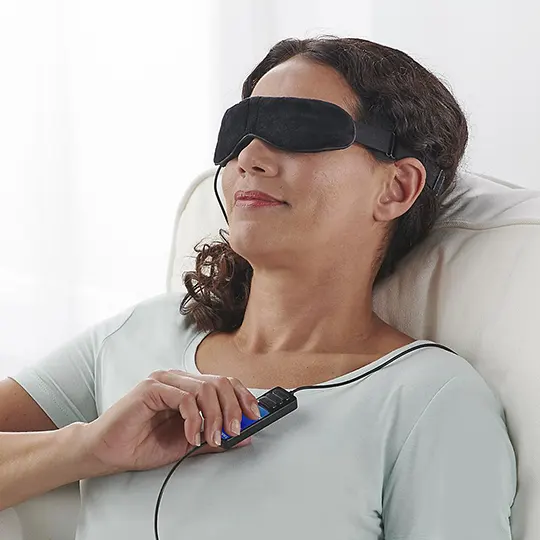Beneficat
Beneficat - General Information
A serotonin uptake inhibitor that is used as an antidepressive agent. It has been shown to be effective in patients with major depressive disorders and other subsets of depressive disorders. It is generally more useful in depressive disorders associated with insomnia and anxiety. This drug does not aggravate psychotic symptoms in patients with schizophrenia or schizoaffective disorders. (From AMA Drug Evaluations Annual, 1994, p309)
Pharmacology of Beneficat
Beneficat is an antidepressant and hypnotic chemically unrelated to tricyclic, tetracyclic, or other known antidepressant agents. The mechanism of trazodone's antidepressant action in man is not fully understood. In animals, trazodone selectively inhibits serotonin uptake by brain synaptosomes and potentiates the behavioral changes induced by the serotonin precursor, 5-hydroxytryptophan. Cardiac conduction effects of trazodone in the anesthetized dog are qualitatively dissimilar and quantitatively less pronounced than those seen with tricyclic antidepressants. Beneficat is not a monoamine oxidase inhibitor and, unlike amphetamine-type drugs, does not stimulate the central nervous system. In man, trazodone is well absorbed after oral administration without selective localization in any tissue. Since the clearance of trazodone from the body is sufficiently variable, in some patients trazodone may accumulate in the plasma.
Beneficat for patients
Prescribers or other health professionals should inform patients, their families, and their caregivers about the benefits and risks associated with treatment with DESYREL and should counsel them in its appropriate use. A patient Medication Guide About Using Antidepressants in Children and Teenagers is available for DESYREL. The prescriber or health professional should instruct patients, their families, and their caregivers to read the Medication Guide and should assist them in understanding its contents. Patients should be given the opportunity to discuss the contents of the Medication Guide and to obtain answers to any questions they may have. The complete text of the Medication Guide is reprinted at the end of this document.
Patients should be advised of the following issues and asked to alert their prescriber if these occur while taking DESYREL.
Clinical Worsening and Suicide Risk:
Patients, their families, and their caregivers should be encouraged to be alert to the emergence of anxiety, agitation, panic attacks, insomnia, irritability, hostility, aggressiveness, impulsivity, akathisia (psychomotor restlessness), hypomania, mania, other unusual changes in behavior, worsening of depression, and suicidal ideation, especially early during antidepressant treatment and when the dose is adjusted up or down. Families and caregivers of patients should be advised to observe for the emergence of such symptoms on a day-to-day basis, since changes may be abrupt. Such symptoms should be reported to the patient's prescriber or health professional, especially if they are severe, abrupt in onset, or were not part of the patient's presenting symptoms. Symptoms such as these may be associated with an increased risk for suicidal thinking and behavior and indicate a need for very close monitoring and possibly changes in the medication.
Because priapism has been reported to occur in patients receiving DESYREL, patients with prolonged or inappropriate penile erection should immediately discontinue the drug and consult with the physician.
Antidepressants may impair the mental and/or physical ability required for the performance of potentially hazardous tasks, such as operating an automobile or machinery; the patient should be cautioned accordingly.
DESYREL may enhance the response to alcohol, barbiturates, and other CNS depressants.
DESYREL should be given shortly after a meal or light snack. Within any individual patient, total drug absorption may be up to 20% higher when the drug is taken with food rather than on an empty stomach. The risk of dizziness/lightheadedness may increase under fasting conditions.
Medication Guide
About Using Antidepressants in Children and Teenagers
What is the most important information I should know if my child is being prescribed an antidepressant?
Parents or guardians need to think about 4 important things when their child is prescribed an antidepressant:
- There is a risk of suicidal thoughts or actions
- How to try to prevent suicidal thoughts or actions in your child
- You should watch for certain signs if your child is taking an antidepressant
- There are benefits and risks when using antidepressants
1. There is a Risk of Suicidal Thoughts or Actions
Children and teenagers sometimes think about suicide, and many report trying to kill themselves.
Antidepressants increase suicidal thoughts and actions in some children and teenagers. But suicidal thoughts and actions can also be caused by depression, a serious medical condition that is commonly treated with antidepressants. Thinking about killing yourself or trying to kill yourself is called suicidality or being suicidal.
A large study combined the results of 24 different studies of children and teenagers with depression or other illnesses. In these studies, patients took either a placebo (sugar pill) or an antidepressant for 1 to 4 months. No one committed suicide in these studies, but some patients became suicidal. On sugar pills, 2 out of every 100 became suicidal. On the ant idepressants, 4 out of every 100 patients became suicidal.
For some children and teenagers, the risk of suicidal actions may be especially high.
These include patients with
- Bipolar illness (sometimes called manic-depressive illness)
- A family history of bipolar illness
- A personal or family history of attempting suicide
If any of these are present, make sure you tell your healthcare provider before your child takes an antidepressant.
2. How to Try to Prevent Suicidal Thoughts and Actions
To try to prevent suicidal thought and actions in your child, pay close attention to changes in her or his moods or actions, especially if the changes occur suddenly. Other important people in your childís life can he lp by paying attention as well (e.g., your child, brothers and sisters, teachers, and other important people). The changes to look out for are listed in Section 3, on what to watch for.
Whenever an antidepressant is started or its dose is changed, pay close attention to your child.
After starting an antidepressant, your child should generally see his or her healthcare provider:
- Once a week for the first 4 weeks
- Every 2 weeks for the next 4 weeks
- After taking the antidepressant for 12th weeks
- After 12 weeks, follow your healthcare providerís advice about how often to come back
- More often if proble ms or questions arise
You should call your childís healthcare provider between visits if needed.
3. You Should Watch For Certain Signs If Your Child is Taking an Antidepressant
Contact your childís healthcare provider right away if your child exhibits any of the following signs for the first time, or if they seem worse, or worry you, your child, or your childís teacher:
- Thoughts about suicide or dying
- Attempts to commit suicide
- New or worse depression
- New or worse anxiety
- Feeling very agitated or restless
- Panic attacks
- Difficulty sleeping (insomnia)
- New or worse irritability
- Acting aggressive, being angry, or violent
- Acting on dangerous impulses
- An extreme increase in activity and talking
- Other unusual changes in behavior or mood
Never let your child stop taking an antidepressant without first talking to his or healthcare provider. Stopping an antidepressant suddenly can cause other symptoms.
4. There are Benefits and Risks When Using Antidepressants
Antidepressants are used to treat depression and other illnesses. Depression and other illnesses can lead to suicide. In some children and teenagers, treatment with an antidepressant increases suicidal thinking or actions. It is important to discuss all the risks of treating depression and also the risks of not treating it. You and your child should discuss all treatment choices with your healthcare provider, not just the use of antidepressants.
Other side effects can occur with antidepressants.
Of all antidepressants, only fluoxetine (Prozac®) has been FDA approved to treat pediatric depression.
For obsessive compulsive disorder in children and teenagers, FDA has approved only fluoxetine (Prozac®), sertraline (Zoloft®), fluvoxamine, and clomipramine (Anafranil®).
Your healthcare provider may suggest other antidepressants based on the past experience of your child or other family members.
Is this all I need to know if my child is being prescribed an antidepressant?
No. This is a warning about the risk for suicidality. Other side effects can occur with antidepressants. Be sure to ask your healthcare provider to explain all the side effects of the particular drug he or she is prescribing. Also ask about drugs to avoid when taking an antidepressant. Ask your healthcare provider or pharmacist where to find more information.
Zoloft® is a registered trademark of Pfizer Pharmaceuticals
Anafranil® is a registered trademark of Mallinckrodt Inc.
This Medication Guide has been approved by the U. S. Food and Drug Administration for all antidepressants.
Revised January 26, 2005
Beneficat Interactions
In vitro drug metabolism studies suggest that there is a potential for drug interactions when trazodone is given with CYP3A4 inhibitors. Ritonavir, a potent CYP3A4 inhibitor, increased the Cmax, AUC, and elimination half- life, and decreased clearance of trazodone after administration of ritonavir twice daily for 2 days. Adverse effects including nausea, hypotension, and syncope were observed when ritonavir and trazodone were coadministered. It is likely that ketoconazole, indinavir, and other CYP3A4 inhibitors such as itraconazole or nefazodone may lead to substantial increases in trazodone plasma concentrations, with the potential for adverse effects. If trazodone is used with a potent CYP3A4 inhibitor, a lower dose of trazodone should be considered.
Carbamazepine reduced plasma concentrations of trazodone when co-administered. Patients should be closely monitored to see if there is a need for an increased dose of trazodone when taking both drugs.
Increased serum digoxin or phenytoin levels have been reported to occur in patients receiving DESYREL concurrently with either of those two drugs.
It is not known whether interactions will occur between mono-amine oxidase (MAO) inhibitors and DESYREL. Due to the absence of clinical experience, if MAO inhibitors are discontinued shortly before or are to be given concomitantly with DESYREL, therapy should be initiated cautiously with gradual increase in dosage until optimum response is achieved.
Therapeutic Interactions
Concurrent administration with electroshock therapy should be avoided because of the absence of experience in this area.
There have been reports of increased and decreased prothrombin time occurring in warfarinized patients who take DESYREL.
Beneficat Contraindications
DESYREL is contraindicated in patients hypersensitive to DESYREL.
Additional information about Beneficat
Beneficat Indication: For the treatment of depression.
Mechanism Of Action: Beneficat binds at 5-HT2 receptor, it acts as a serotonin agonist at high doses and a serotonin antagonist at low doses. Like fluoxetine, trazodone's antidepressant activity likely results from blockage of serotonin reuptake by inhibiting serotonin reuptake pump at the presynaptic neuronal membrane. If used for long time periods, postsynaptic neuronal receptor binding sites may also be affected. The sedative effect of trazodone is likely the result of alpha-adrenergic blocking action and modest histamine blockade at H1 receptor. It weakly blocks presynaptic alpha2-adrenergic receptors and strongly inhibits postsynaptic alpha1 receptors. Beneficat does not affect the reuptake of norepinephrine or dopamine within the CNS.
Drug Interactions: Not Available
Food Interactions: Avoid alcohol.
Take with food.
Avoid St.John's Wort.
Generic Name: Trazodone
Synonyms: Trazodonum [Inn-Latin]; Trazodona [Inn-Spanish]; Trazodone Hcl; Trazodone Hydrochloride
Drug Category: Antidepressants, Second-Generation; Anti-anxiety Agents; Serotonin Uptake Inhibitors
Drug Type: Small Molecule; Approved; Investigational
Other Brand Names containing Trazodone: Beneficat; Bimaran; Desirel; Desyrel; Molipaxin; Pragmazone; Sideril; Thombran; Tombran; Trazalon; Trazodil; Trazodon; Trazolan; Trazonil; Trialodine; Trittico;
Absorption: Well absorbed following oral administration.
Toxicity (Overdose): LD50=96mg/kg (i.v. in mice)
Protein Binding: 89-95%
Biotransformation: Hepatic
Half Life: 3-6 hours
Dosage Forms of Beneficat: Tablet Oral
Chemical IUPAC Name: 2-[3-[4-(3-chlorophenyl)piperazin-1-yl]propyl]-[1,2,4]triazolo[4,5-a]pyridin-3-one
Chemical Formula: C19H22ClN5O
Trazodone on Wikipedia: https://en.wikipedia.org/wiki/Trazodone
Organisms Affected: Humans and other mammals




